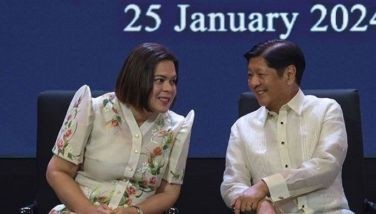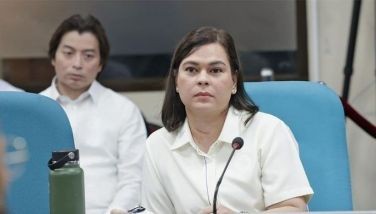Their life in song
A few minutes before a performance at Bathurst, New South Wales, the main tent where Cebu’s University of the Visayas Chorale was set to sing was still empty. Outside, over a thousand youth pilgrims who converged here prior to World Youth Day in Sydney headed to a nearby tent from where rock music blared.
Their Australian bus driver jokingly offered to bellow for crowds or pull the plug on the rock concert.
Despite their apprehension, the choir – after their routine of praying before singing – faced the bright lights and the curious few who checked them out. After all, their motto was that there are no small or big gigs if you sing your heart out.
But as their voices soared in song after song, the crowd started coming in, finally more than doubling the audience in the rock concert. A small group of Filipino pilgrims from Iloilo proudly waved their little flags for their performing kababayans.
As the chorale performed their finale, the very international audience was on its feet, dancing and applauding. It was a proud moment that no Filipino would want to miss.
This would be replicated in many stops during their World Youth Day Australian tour last July. The 23-member, mixed-voice choir of high school and college students was the only Filipino performing group featured in the WYD music festivals. For this, they received a Global Filipino Youth Award from the Global Filipinos Australia Inc. at the State Parliament House in Sydney last July 14.
It was another feather in the cap of Cebu’s youthful choir. Late last year, their first-ever international competition yielded a silver for the Ethnic Category and a bronze for the Classical Category, plus an “Internationally Very Good” ranking at the prestigious Busan International Chorale Competition.
But that’s getting ahead of the story, which began in 1999 when the university’s executive vice-president, Jose R. Gullas, revived a tradition of his mother, Pining Rivera Gullas, to grant full scholarships to vocally talented high school students. His mother, who formed a boys’ choir in the 1970s that became the first Cebuano choral group to win in the National Competition for Young Artists (NAMCYA), usually asks the choir to sing in masses in different churches in the city, the soft-spoken educator and former congressman recalls. “There was a long hiatus when my mother passed away in 1984, yet memories of it keep coming back to me,” he says.
Gullas, who also revived Cebu’s oldest newspaper, the family-owned Freeman, now part of The STAR Group of publications, thus decided to form the present choir with the same purpose of singing liturgy.
In 2006 the choir almost disbanded, after a serious problem with their then choirmaster. Gullas recalls now that it was the pleas of many of the members that made him decide to keep the group going. “They came to me in tears. I did not realize that many of them belong to below-average income families, and that they were able to sustain their schooling only through the scholarship. I was profoundly touched when they said, ‘What we don’t have in our pockets, we think we can give it through music and song,’” shares Gullas, who is supported by his wife Nena, who serves as the choir’s manager.
Completing the choir’s “rebirth” was the entry of Anna Tabita Abeleda Pequero, a former Madrigal singer and multi-awarded choirmaster based in Manila, as trainer. She pushed and challenged the choir, daring them to go beyond winning in local competitions to finally compete on an international stage.
There were 39 choirs from all over the world battling it out at the Busan International Choral Competition, and Gullas admits “We didn’t raise our hopes too high.” Even as Filipino conductor Jonathan Velasco, who has given choral workshops and judged choral contests overseas, acknowledged that “Iba talaga ang tunog ng Cebuano (Cebuanos really sound different),” they were also told that, as first-timers, they had to accept the possibility of going home empty-handed.
“So, when the choir won silver and bronze, it was our proudest moment,” Gullas beams.
These international exploits re-energized the choir’s presence in Cebu, and they are now often tapped to perform before visiting officials and VIPs.
“When we had our first hotel concert last year, we were worried because nobody might come,” says Nena. But they came – politicians, people from business and the academe. The concert was so successful that they were able to raise funds to finance their Busan trip.
The reaction to the hotel concert was no different from that of the very simple townsfolk in the faraway, southern municipality of Oslob that was still reeling from a fire that reduced its iconic, historical church to rubble. Turning over funds raised through a previous benefit concert to help rebuild the church, their special performance, a first for most of the audience, became a truly uplifting musical treat.
What makes the choir exciting to watch is that they offer something beyond the traditional. There’s a lot of movement and youthful razzmatazz, and unmistakable energy – energy that served them well during their hectic Australian tour, where they had to sing practically every day for three weeks without their choirmaster, who was competing in Europe. It could have been a disadvantage, but instead it endeared them to the audiences.
The choir members themselves can hardly believe how far they’ve come. When reviewing their performances on video, they appear genuinely overwhelmed, asking each other: “Is that us? Is that really us?”
To those who have closely followed the choir, however, there’s no mistaking the maturity of their voices, stage presence, and overall musicality. From a scrappy bunch of very raw talents who never had formal music lessons let alone exposure to classical music, they can now deftly read notes and interpret arias, sacred music and songs in different languages. It hasn’t been easy: they work hard, practising at least three hours five times a week, even without the watchful eye of the Manila-based Pequero at times. On top of that they keep up with their studies, since their grades are checked regularly and failing grades are not tolerated.
More importantly, they agree, their lives, personalities and perspectives have been changed for the better. “I believe the choir has really provided them with wholistic learning experiences, a family and values,” Gullas says.
Take, for example, 16-year-old Shiela who used to join amateur singing contests to help earn money for the family. “Pamugas jud (I literally joined to buy rice),” admits Shiela, whose father is a taxi driver. Now with her scholarship, she no longer joins contests. The soprano gushes with excitement when she talks about traveling abroad, meeting new friends, and making her parents proud.
Jairus needed a scholarship to stay in school so he joined all sorts of school-based organizations – from boyscouts to drum corps. He auditioned for the choir not even sure if he could sing. His best friend James also auditioned, but was so shy he didn’t pass the first audition. Now, Jairus is the group’s assistant conductor and intends to pursue music studies. And James, who could hardly open his mouth and sing, is a crowd favorite with his exuberant dancing and his solos.
Christopher, who comes from a family of OFW entertainers, stopped schooling for a couple of years when he was part of a rock band. He auditioned for the choir to be able to continue his studies. He says the choir has opened his mind to higher levels of music. Now, if you ask for his musical idols, the punk “rakista” has been replaced by the Madz or the Philippine Madrigal Singers, twice judged the best choral group in the world.
Another member, Lagmar, had a cleft palate that made him insecure. He says that being with the choir gave him self-confidence, and he now takes many solo parts in the choir’s repertoire.
For Nepthalie, the choir kept him from joining a street gang. There are times when he bumps into gang members who had tried to recruit him. “Proud sila sa akong naadtoan, akong naabot uban sa choir. (They are proud of how far I’ve gone, what I’ve achieved with the choir),” he says. “With our schedules and experiences, there’s just no time or reason to misbehave.”
Christian, the group’s guitarist, says that being part of the choir helped him on a level that he least expected. “I didn’t care about faith or things like that. But our experiences make us feel blessed and teaches us to be spiritual,” he shares. “The choir gave us direction.”
“People ask me why I took the effort, expense and challenge of reviving and sustaining the choir,” Gullas says. “Perhaps it’s because I just want to continue what my mother has started, giving these young talented people a means to a better education.”
As for the choir, they will continue to sing their hearts out wherever their God-given talents will bring them.
- Latest
- Trending


















